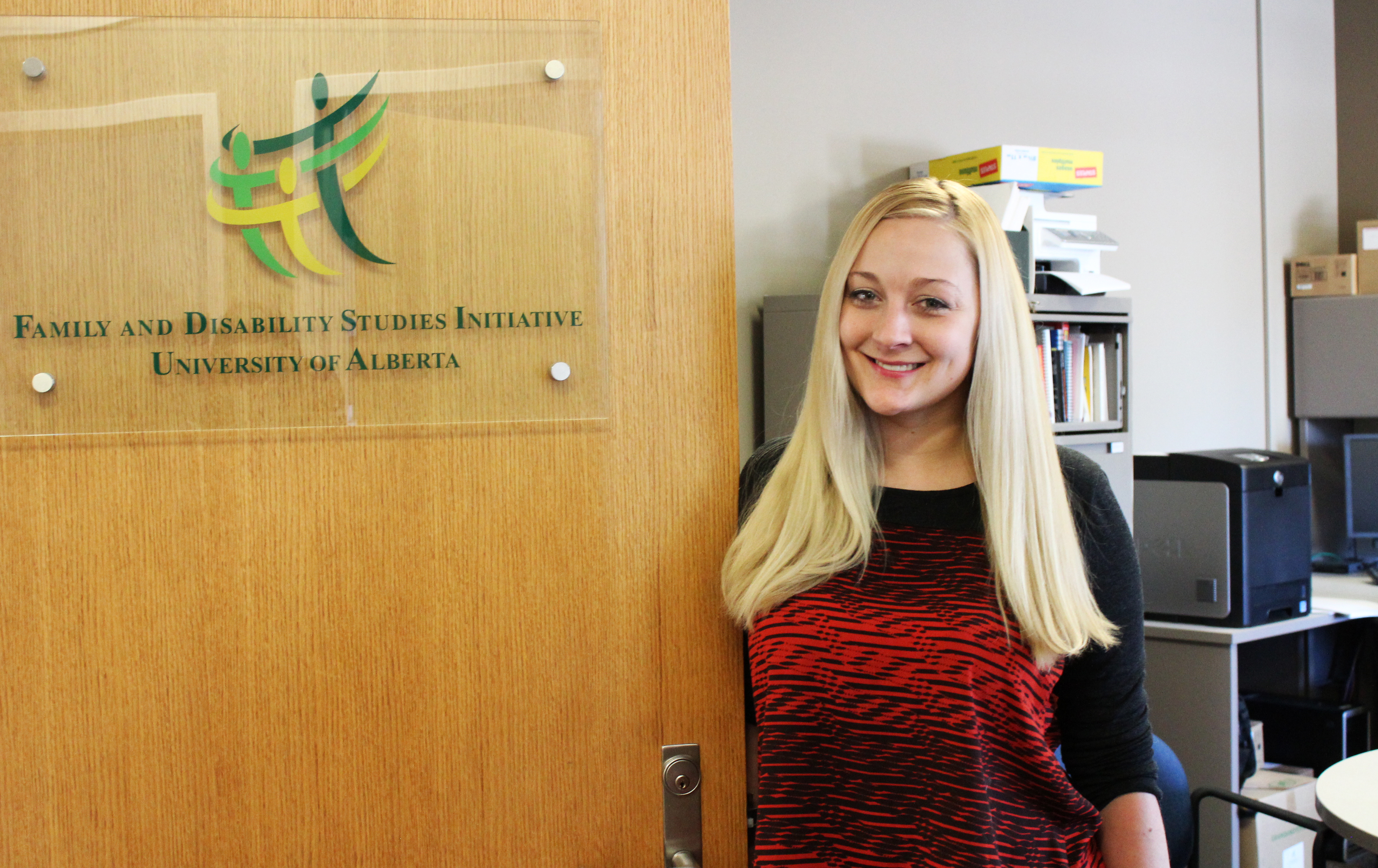
Amber Savage, PhD candidate, works under David McConnell at the Family and Disability Studies Initiative.
(Edmonton) The Faculty of Rehabilitation Medicine's first Queen Elizabeth Scholar is back (and better than ever) from the University of Sydney after a semester conducting international research at the Faculty of Health Sciences, Centre for Disability Research and Policy.
Amber Savage, PhD candidate in rehabilitation science at the University of Alberta, brought her passion for family and disability studies to Australia, as part of the prestigious Canadian Queen Elizabeth II Diamond Jubilee Scholarship program.
Making a difference in the lives of children has always been something Savage has wanted to do. Her research focus on the well-being of Canadian children and youth with disabilities, brings her closer to reaching that goal.
"My interest in disability advocacy was sparked by working with children with disability while pursuing my undergraduate degree," says Savage. "Applying to the MSc Occupational Therapy program was the next logical step."
Savage is now a registered occupational therapist and started working alongside David McConnell, her PhD supervisor and professor in occupational therapy, in 2010. Since then, Savage has led or been part of research teams at the Family and Disability Studies Initiative group studying topics that impact Canadian families and individuals with disabilities: the social-ecology of family resilience, work/life balance in families raising children with disabilities, parenting with disabilities, and more.
"My doctoral work involves analyzing Statistics Canada data spanning a decade to identify mechanisms linking disability, socially-patterned disadvantage, and subjective well-being across childhood," explains Savage. "Findings may be used to inform policies promoting the participation and well-being of children with disabilities and their families."
As a Queen Elizabeth Scholar, Savage had the opportunity to enrich her research skills abroad. The scholarships were established by the Government of Canada to encourage graduate students to explore diversity through international research experiences in commonwealth countries. She was nominated by McConnell and Tammy Hopper, vice dean, Faculty of Rehabilitation Medicine, for her research in youth disabilities.
"It was intimidating at first," says Savage. "But having the opportunity to contribute to international research was very rewarding."
While at the University of Sydney, Savage contributed to research projects on a range of topics including the gendered experience of rehabilitation for women with acquired brain injury and young adults with disabilities experiences of discrimination in public places.
One of the projects Savage worked on was looking at data from UNICEF's Multiple Indicator Cluster Surveys, the largest source of statistically sound and internationally comparable data on women and children worldwide.
"I worked with Professor Eric Emerson, a leading disability scholar, to identify factors associated with risk of intellectual disability among children in low-and middle income countries," says Savage. "So far we have submitted publications to the Bulletin of the World Health Organization and The Journal of Intellectual Disability Research; the collaboration is ongoing."
During her internship, Savage also had the opportunity to attend World Health Organization (WHO) meetings and experience the inner workings of the WHO Collaborating Centre.
"Working with world-class scholars and human rights activists, Amber had the opportunity to deepen her understanding and engagement with global disability research and policy," says McConnell, Savage's PhD supervisor.
For Savage, having contributed to international projects has enhanced her purpose for conducting research in children and youth disabilities. It is a global phenomenon that can affect everyone around the world, regardless of where you live.
"Being immersed in an innovative and well established research community gave me a new appreciation for the importance of the work we do here, and of how the work we do can contribute to the broader picture."
___________________________________________________________
The Faculty of Rehabilitation Medicine at the University of Alberta
As the only free-standing faculty of rehabilitation medicine in North America, the Faculty of Rehabilitation Medicine's vision is to be at the forefront of knowledge generation and scholarship in rehabilitation. Through excellent teaching, research and service to the community, the Faculty is committed to enhancing quality of life, promoting participation and autonomy, and improving function for citizens in Alberta and beyond.
A research leader in musculoskeletal health, spinal cord injuries, common spinal disorders (back pain), seniors and dementia and speech-language disorders, the Faculty of Rehabilitation Medicine aims to inspire the realization of the full potential of individuals, families and communities. The three departments, Occupational Therapy (OT), Physical Therapy (PT) and Communication Sciences and Disorders (CSD) offer professional entry programs. The Faculty offers thesis-based MSc and PhD programs in Rehabilitation Science, attracting students from a variety of disciplines including OT, PT, SLP, psychology, physical education, medicine and engineering.